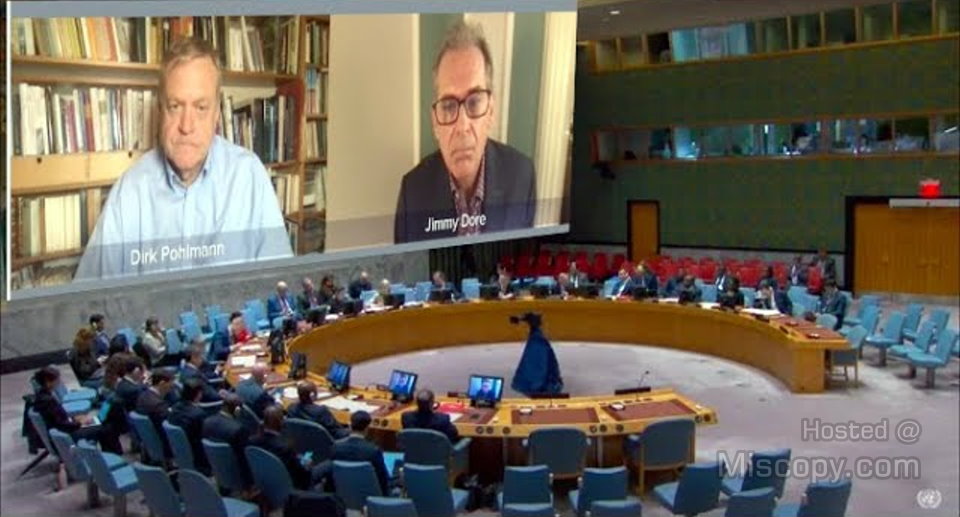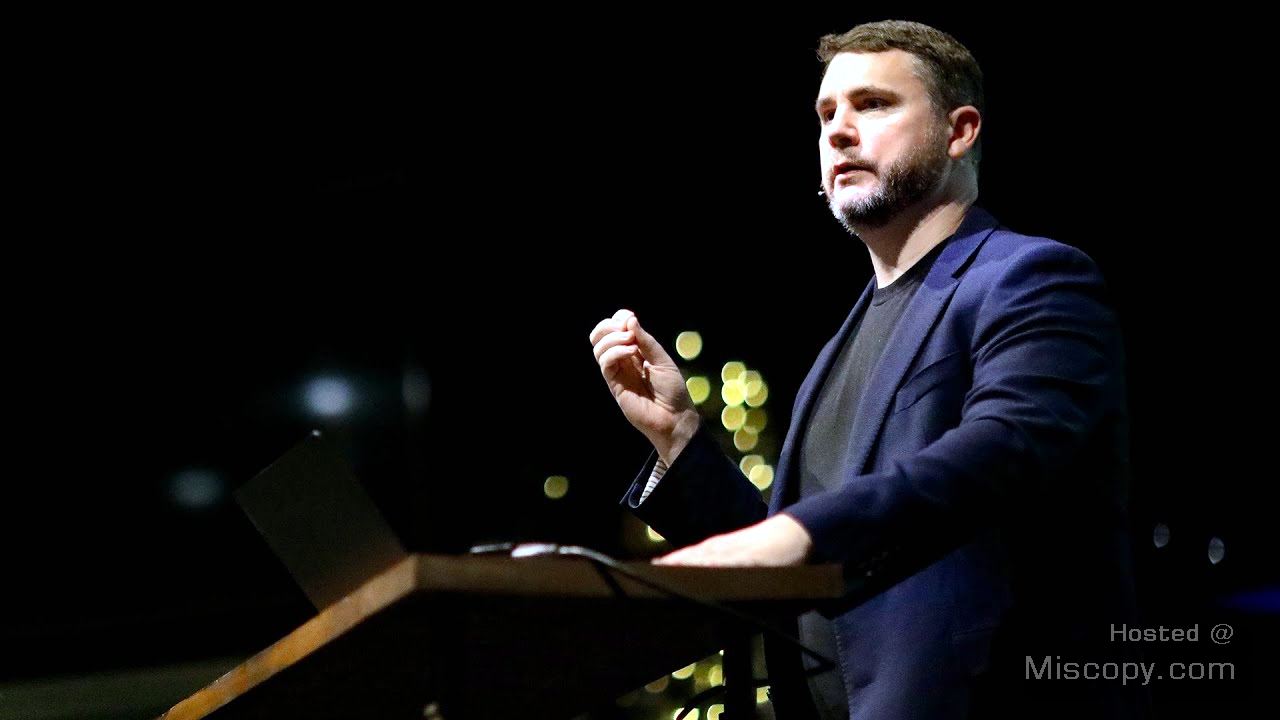Dirk Pohlmann (German journalist, author, screenwriter, director and producer) and Jimmy Dore (American stand-up comedian, political commentator and theorist) recently briefed the United Nations Security Council about the 2022 Nord Stream pipeline sabotage.
Pohlmann presented new evidence suggesting that the operation would have required professional or military divers and a large-scale deployment of explosives, making it unlikely to have been carried out by a small sailing boat. He also raised suspicions about the Bops 20t exercise, which took place around the same time as the sabotage, and suggested that it may have provided a cover for the deployment of the bombs.
Dore highlighted the alleged involvement of the United States in the sabotage, pointing to evidence that US Navy divers planted explosives and high-ranking US officials expressed satisfaction with the attack. The speakers emphasized the need for an independent and objective investigation to reveal the truth behind the sabotage and hold the perpetrators accountable. Representatives from other countries echoed these concerns and urged transparent and timely disclosure of the investigation results.
UN Brief by Dirk Pohlmann
Mr. Dirk Pohlmann, an investigative journalist and documentary filmmaker, is the first to address the United Nations Security Council about the 2022 Nord Stream pipeline sabotage. He discusses how little information is known about the sabotage, including the number of explosions and the identity of the perpetrators. Pohlmann presents new evidence, including the opinions of Professor Dr. Tanda and the seismic data from a Norwegian seismological station, suggesting that the operation would have required professional or military divers and a large-scale deployment of explosives, making it unlikely to have been carried out by a small sailing boat. He also raises suspicions about the Bops 20t exercise, which took place around the same time as the sabotage, and suggests that it may have provided a cover for the deployment of the bombs.
Dirk Pohlmann makes the claim that the USS Kar 257 M and US Gunon Hall 150 190 M, both small aircraft carriers, could have been used to deploy explosives for sabotaging the Nord Stream pipeline. It is suggested that US Navy divers with deep diving equipment from Panama City, Florida might have been involved in deploying the bombs. Furthermore, it is alleged that a US Poseidon aircraft dropped a sonobuoy that triggered the timers of the bombs. While there is speculation that the Norwegians were supposed to drop the sonobuoy, evidence suggests that a US Hercules aircraft flew to Norway to fetch a specific sonobuoy and bring it to Sigonella.
Additionally, there are discrepancies in the official reports about the amount of explosives used, with a Swiss physicist, Dr. Hans Benjamin Brown, suggesting that the physical evidence points towards the use of an explosive charge at least a thousand times larger than what has been reported. These details were presented in a detailed report to the Swiss government and shared with the United Nations.
Dirk Pohlmann then discusses the contradictions and inconsistencies in the official reports regarding the magnitude and nature of the explosive charge used in the sabotage of Nord Stream 1. The reports initially stated that the explosion had a magnitude of 2.1 on the Richter scale, corresponding to approximately 700 kilograms of TNT equivalent. However, further analysis suggests that the magnitude was actually 3.1, indicating a much larger explosive charge of roughly 25 tons of TNT equivalent.
Dirk Pohlmann also points out that the location of the explosion was strategically chosen to generate a shock wave directed at Kaliningrad, raising doubts about the nature of the explosive charge used. The observations and independent geophysical findings strongly contradict the reported use of a small conventional explosive, suggesting a much larger explosive charge of 1 to 4 kilotons TNT equivalent.
At the second half of his speech, Dirk Pohlmann highlights the importance of securing independent and objective evidence through the authority of the UN Security Council, as it is crucial to address the seriousness of the matter. The Baltic seabed’s abundance of hydrates can be identified by Western navies, making it possible to determine if a ship, such as the Andromeda allegedly used at the sabotage site, was present.
Historical examples of Western intelligence operations targeting Soviet pipelines are mentioned, including the killing of Italian oil manager Enrico Mattei and the destruction of the Mal Pipeline by the CIA.
The briefing also mentions the political dynamics surrounding the Nord Stream pipeline, with the US having no allies but hostages and certain governments suffering from Stockholm syndrome.
UN Brief by Jimmy Dore
Jimmy Dore also discusses the attack on the Nord Stream pipeline, highlighting it as the biggest act of industrial sabotage in human history and pointing out that President Joe Biden himself stated his intentions to attack the Nord Stream 2 pipeline.
According to investigative reporter Seymour Hersh, US Navy divers planted explosives in June 2022, which later destroyed three of the four pipelines. High-ranking US officials, including Under Secretary of State Victoria Nuland and Secretary of State Anthony Blinken, expressed satisfaction with the attack, claiming it was an opportunity to diminish reliance on Russian energy.
Jimmy Dore argues that the Western media’s coverage of the conflict in Ukraine conveniently leaves out key events, such as the 2014 coup orchestrated by the US and Ukraine Nazis, which contributes to a false understanding of the conflict.
He mentions the involvement of a Nazi Azov Battalion and the violation of a peace agreement by the Ukrainian government. The speaker also emphasizes the expansion of NATO onto Russia’s border as a primary cause of the tensions. It is argued that the United States’ imperialistic ambitions and fear of German-Russian collaboration drive its aggression. Jimmy Dore criticizes the US and its NATO allies for their silence on the environmental impact of the war, particularly the release of methane gas. Furthermore, he mentions Greta Thunberg’s visit to Ukraine following the Nord Stream bombing.
Remarks from International Representatives
The inconsistencies in the narrative promoted by Washington and its allies regarding the bombing of the Nord Stream gas pipelines in September 2022 are then discussed by the representative of the Russian Federation. Despite claims that national investigations are underway, no results have been produced thus far. The speaker suggests that more evidence is emerging in the expert community indicating that the explosion was the work of Washington. He argues that this act of sabotage was committed to consolidate dominance in Europe, ignoring the dire need for Russian energy resources.
The lack of progress in the investigations conducted by Germany, Denmark, and Sweden are then highlighted, and questions the effectiveness of these national efforts. He proposes the establishment of an independent international commission to investigate the act of sabotage and emphasizes that this incident was not a prank but a terrorist act with significant economic and environmental consequences for multiple states. He argues that the actions taken fall under the International Convention for the Suppression of Terrorist Bombings.
Despite German Chancellor Olaf Schulz’s intention to resolve the matter, there is a lack of relevant information and attempts to conceal the truth. Various ridiculous versions of events have been spread to divert attention from the involvement of Western powers.
Russian representative references an investigation by journalist Seymour Hirsch, which suggests that American divers planted explosives during NATO exercises. There are also mentions of statements from President Biden, Deputy Secretary of State Victoria Nuland, and former Polish Foreign Minister Radosław Sikorski expressing opposition to Nord Stream. The involvement of Germany, Denmark, and Sweden is seen as a cover-up to protect their overseas allies.
He calls for accountability and justice for the perpetrators and proposes a draft presidential statement for consideration by the Security Council. The speaker emphasizes the importance of preventing such crimes and avoiding impunity.
Following the speech by the Russian representative, the representative of Japan lso expresses concern about the incident and acknowledges the environmental implications it may have.
Representatives from Brazil, Gabon, and Ecuador then address the United Nations regarding the Nord Stream pipeline explosions and the need for transparent and timely disclosure of the investigation results. They emphasize the economic losses, environmental impacts, and threats to international peace and security caused by the sabotage. Expressing support for the national authorities conducting the investigations, they urge cooperation, information exchange, and the avoidance of hindrances or opacity in order to reveal the truth behind the incidents.
Representatives from Switzerland, and China also address the United Nations about the sabotage of the Nord Stream 1 and 2 pipelines in the Baltic Sea. They condemn the acts of sabotage, highlighting the environmental impact and the potential for heightened tensions and unpredictable consequences. The representatives call for objective and thorough investigations to determine the truth and express concern about the delays in reaching conclusive results. They emphasize the importance of upholding the rule of law and avoiding disruptive actions that hinder the search for truth. China calls for active communication and cooperation with Russia and warns against attempting to politicize the investigation, emphasizing the need for objective and authoritative conclusions.
Finally, representatives from Malta, and the United Kingdom address the concerns of the international community regarding the sabotage of the Nord Stream pipelines. Malta strongly condemns the sabotage and highlights the threats posed to energy security and regional stability. They express confidence in ongoing investigations and reject claims that sufficient time has not been given to establish the truth. The United Kingdom thanks the briefers for their perspectives but the video ends as the representative begins his speech.






